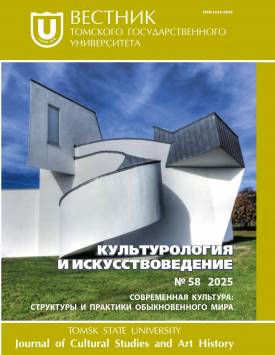The role of consumption in the processes of human survival as a subject of culture
The mankind existence suggests the constant process of transformations and changes of those things that were created by nature and the invention of technologies and methods to survive, that become a supra-biological experience of human existence. Consumption is directly related to the everyday life of a particular society, the values and value orientations of consumers and their personal, group and public interests, which necessitates their scientific analysis and explanation. Consumption processes have repeatedly become the subject of scientific interest from a variety of angles. Starting with M. Weber, consumption began to be analysed as an expression of status differences, a demonstration of prestige. T. Veblen points out that consumption is a way to preserve and form an opinion about oneself as a person belonging to a certain status or group. P. Bourdieu also writes about the consolidation and maintenance of status differences through consumption. J. Baudrillard speaks about t forming a consumer culture that is based on subtle differences in the social hierarchy. I.V. Pechkurov, Ya. M. Roshchina, S.V. Borodulina and others develop concepts of “economic identity” and “consumer identity”. K.V. Arkhangelskaya, L.A. Zaks consider consumption as a way of self-identification and a mechanism of identity construction. The purpose of this article is to analyze the types of consumption in the context of sociocultural history, to identify the forms and connections of consumption with the type of subject in the context of accepting the role of “Other,” as well as to analyze the dynamics of the relationship between the consumer and the product (thing) in the history of culture. The author identifies and analyzes three types of consumption: pragmatic, demonstrative and selfish. Pragmatic consumption differs by the rationalism and greater stability in relation to the list of consumed goods. Its aim is to survive and maintain vital interests. It is associated with the formation of a sense of “We”, belonging to the same culture, same lifestyle, possessing a collective “I”. Demonstrative consumption is distinguished by its focus on others, the desire of a person to show himself to others, to tell others about himself, therefore it is aimed at others and has an extroverted nature. Relationships here are built on the “We-Others” principle. They are static in nature, since the class system fixed the boundaries between social groups. This type of consumption is aimed primarily at drawing boundaries. Since the second half of the 19th century, consumption has become variable, especially in modern culture, since there can be many such “Others” depending on the situation, free choice (where I myself decide who I will be with today). Selfish consumption is personal in nature. It is the most emotionally charged and less rational of all, and represents a system of a person’s relationship with himself “I-I”. The author declares no conflicts of interests.
Keywords
consumption, consumerism, identification, consumer culture, consumer societyAuthors
| Name | Organization | |
| Chaplya Tatyana V. | Novosibirsk State Pedagogical University | chap_70@mail.ru |
References

The role of consumption in the processes of human survival as a subject of culture | Tomsk State University Journal of Cultural Studies and Art History. 2025. № 58. DOI: 10.17223/22220836/58/13
